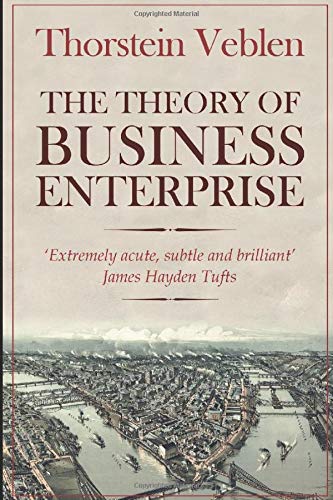Thorstein Veblen’s The Theory of Business Enterprise (1904) is a superb political economy book in which this original economist, talented sociologist and influential intellectual analyzed the growing corporate domination of culture, society and the economy in the US at the dawn of the 20th century. Looking around and thinking about, I recently recalled the following two Veblen’s arguments, which are relevant and acute today as they were 120 years ago. Each era has its own Robber Barons.
“The indirect or incidental cultural bearing of business principles and business practice is wide-reaching and forceful. Business principles have a peculiar hold upon the affections of the people as something intrinsically right and good. They are therefore drawn on for guidance and conviction even in concerns that are not conceived to be primarily business concerns. So, e.g., they have permeated the educational system, thoroughly and intimately. Their presence, as an element of common sense, in the counsels of the “educators” shows itself in a naive insistence on the “practical” whenever the scheme of instruction is under advisement. “Practical” means useful for private gain. Any new departure in public instruction, whether in the public schools or in private endowed establishments, is scrutinized with this test in mind; which results in a progressive, though not wholly consistent, narrowing of instruction to such learning as is designed to give a ready application of results rather than a systematic organization of knowledge… The primary test is usefulness for getting an income. […]
There is also a large resort to business methods in the conduct of the schools; with the result that a system of scholastic accountancy is enforced both as regards the work of the teachers and the progress of the pupils; whence follows a mechanical routine, with mechanical tests of competency in all directions. This lowers the value of the instruction for purposes of intellectual initiative and a reasoned grasp of the subject-matter. This class of erudition is rather a hindrance than a help to habits of thinking. It conduces to conviction rather than to inquiry, and is therefore a conservative factor. […]
A more far-reaching department of the educational system, though not technically rated as such, is the periodical press, both newspapers and magazines. […] The current periodical press, whether ephemeral or other, is a vehicle for advertisements. […] Publishers of periodicals, of all grades of transiency, aim to make their product as salable as may he, in order to pass their advertising pages under the eyes of as many readers as may be. The larger the circulation the greater, other things equal, the market value of the advertising space.
The first duty of an editor is to gauge the sentiments of his readers, and then tell them what they like to believe. By this means he maintains or increases the circulation. His second duty is to see that nothing is said in the news items or editorials which may discountenance any claims or announcements made by his advertisers, discredit their standing or good faith, or expose any weakness or deception in any business venture that is or may become a valuable advertiser. By this means he increases the advertising value of his circulation. The net result is that both the news columns and the editorial columns are commonly meretricious in a high degree.” (Veblen 2016: 222-3).
Veblen, Thorstein. 2016. The Theory of Business Enterprise. New York: Scribners.
***
Join Economic Sociology & Political Economy community via
Facebook / Twitter / LinkedIn / Whatsapp / Instagram / Tumblr / Telegram


[…] Thorstein Veblen on Business Interests in Education and Media […]